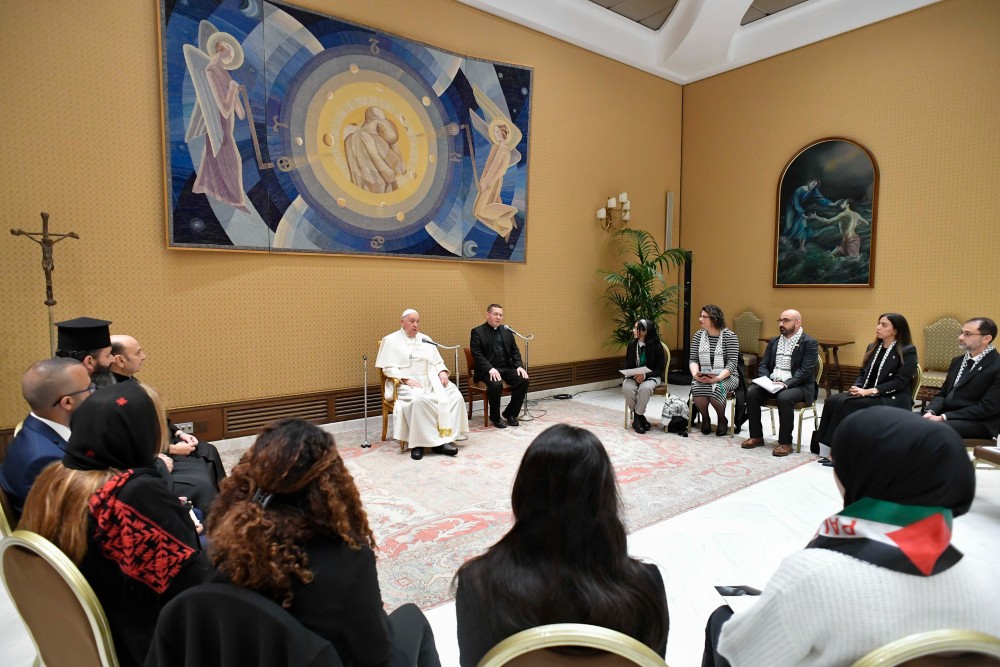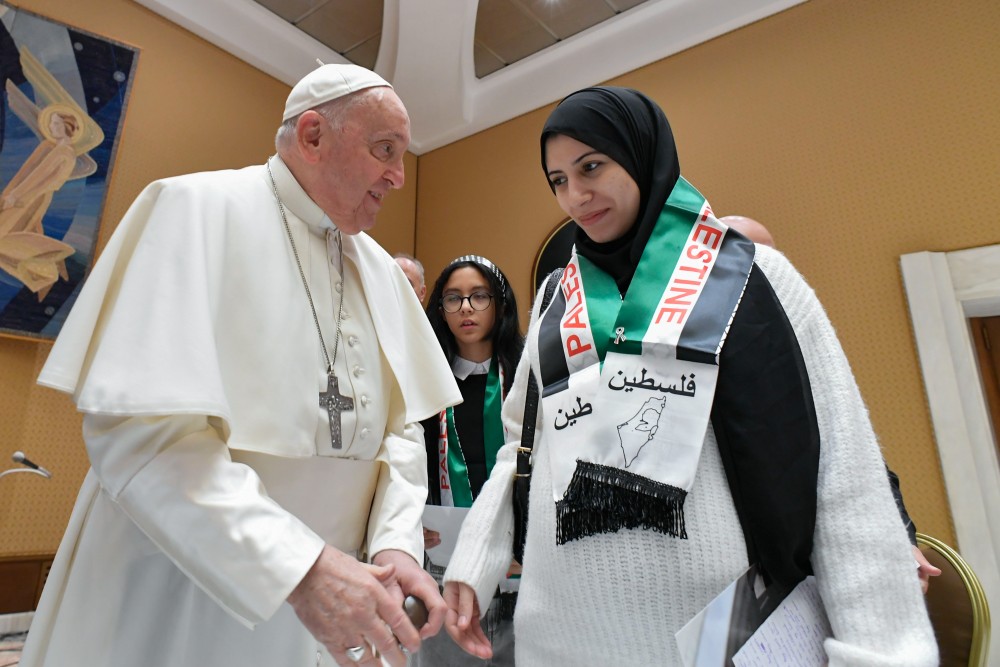
By Cindy Wooden
VATICAN CITY (CNS) — With hopes growing for a temporary, humanitarian cease-fire, Pope Francis met at the Vatican Nov. 22 with relatives of Israelis held hostage by Hamas and, separately, with relatives of Palestinians suffering under the Israeli siege of Gaza.
Announcing the meeting Nov. 17, the director of the Vatican press office insisted the meetings were “of an exclusively humanitarian nature.”
The pope planned the meeting “to show his spiritual closeness to the suffering of each one,” said Matteo Bruni, director of the Vatican press office. The meetings were planned before Qatar’s announcement early Nov. 22 of a possible four-day cease-fire for the release of Israeli hostages and Palestinian prisoners and to allow humanitarian aid into Gaza.
Bruni quoted Pope Francis’ words after the recitation of the Angelus prayer Nov. 12: “Every human being — Christian, Jewish, Muslim — of any people or religion, every human being is sacred, is precious in the eyes of God and has the right to live in peace.”
In a meeting room behind the Vatican audience hall, Pope Francis met with a delegation of 10 Palestinians with family members in Gaza. Suhair Anastas, who holds dual Canadian-Palestinian citizenship, managed to get out of Gaza Nov. 20 with her daughter. Most of the other members of the delegation have lost close family in Gaza but were not living there when the siege began.
Immediately afterward, in his residence, Pope Francis met a delegation of 12 relatives of 14 hostages abducted by Hamas Oct. 7 and taken to Gaza. The hostages include children, young adults and men and women with their spouses or children.
At his weekly general audience after the meetings, Pope Francis told the crowd in St. Peter’s Square: “This morning I received two delegations — one of Israelis who have relatives held hostage in Gaza and the other Palestinians who have relatives who are prisoners in Israel.”

“They are suffering so much,” the pope said, “and I heard how they both suffer.”
Members of both delegations held separate meetings with the press after leaving the pope. Both delegations hoped the pope would amplify their pleas — either for the release of the Israeli hostages or for an end to Israeli military operations in Gaza.
Moshe Leimberg’s wife, 17-year-old daughter Mia, brother-in-law, sister-in-law and her companion “were taken hostage. “It’s been 47 days, and I’m alone,” he told reporters. “My life is not what it was. It never will be again.”
Alexandra Ariev’s 19-year-old sister is another Hamas hostage. “Every minute, every hour is a critical time for them,” she said. Some of the estimated 240 Hamas hostages were injured, some need regular medication. No one knows how any of them are being treated. “Every one of them needs to come home and not in coffins,” she said.
Yehuda Cohen, whose 19-year-old son was kidnapped, told reporters his daughter Romi was in the group of 12 who met the pope. But he was “disappointed” because the meeting lasted only 20 minutes and not all of the 12 had an opportunity to share their stories about their loved ones.
Rachel Goldberg, whose 23-year-old son is a hostage, disagreed with Cohen, insisting that the meeting with the pope was valuable “because when he speaks, the world listens.”
In addition to continue to make public appeals for the release of the hostages, the Israeli delegation hoped Pope Francis would use his influence to allow the Red Cross or other humanitarian organization to visit them and ensure they are being well treated.
And, Leimberg said, they hope Pope Francis will continue to mention the hostages so the world community will not forget them.
Members of the Palestinian delegation — made up of both Christians and Muslims — also had 20 minutes with the pope and told reporters that for the first part of the meeting he spoke about what he hears from the Catholic parish in Gaza.
Pope Francis, they said, insisted that the Hamas attack on Israel Oct. 7 was an unjustified act of terrorism.
But, according to Yosef Alouri, the pope also told them, “Terror cannot justify terror.”
All 10 members of the delegation insisted Pope Francis listened to their stories about the suffering of Palestinians in Gaza, the deaths, the constant bombardment by Israel and the lack of food, water and electricity, and then said, “I see the genocide.”
“As far as I know, he did not use that word,” said Matteo Bruni, director of the Vatican press office said. “He used the terms in which he expressed himself during the general audience and words that in any case represent the dire situation being experienced in Gaza.”
Shireen Awwad Hilal said all Palestinians, not just those in Gaza, are losing hope.
“We do want a cease-fire, but then what’s next?” she asked. The people want peace, but “there should be justice, and this is what we’re really hoping to achieve. We don’t know how yet.”
Khadijah Darabieh, a Gazan who has been living in Belgium for the past nine months, told reporters what she had told Pope Francis: “I am a pregnant woman. I will give birth soon, and I know that my child will live a happy life in Belgium. But what will be the fate of the baby who will be born in Gaza?”
“When I met Holiness Pope and said to him the story about the babies in Gaza, he cried and said to me, ‘I will pray for the children in Gaza’ and pray for my baby to come with good health.”
